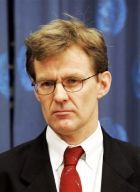Sudan’s Darfur region faces new famine threat: UN
By Irwin Arieff
UNITED NATIONS, Feb 18 (Reuters) – Sudan’s troubled Darfur region faces a new threat of famine if international efforts fail to stop the fighting there, the U.N. emergency relief coordinator warned Friday.
 U.N. aid chief Jan Egeland said aid workers, relief helicopters and food trucks are all under fire from government forces, rebel troops and militia fighters and cannot continue working unless they are better protected.
U.N. aid chief Jan Egeland said aid workers, relief helicopters and food trucks are all under fire from government forces, rebel troops and militia fighters and cannot continue working unless they are better protected.
While an African Union peacekeeping force is slowly being deployed in the region, there are not enough troops to do the job and African leaders and the U.N. Security Council have been too slow to do what is needed to ensure their safety, he said.
While relief workers were able to prevent the massive famine that had been predicted for the area a year ago, “now it is time to say we may not perhaps be able to do so in the coming months if the situation keeps on deteriorating as it has,” Egeland told a news conference.
As many as 4 million people may soon be in desperate need of life-saving assistance, he said.
“Humanitarian workers are frustrated and angry with the situation. Many of them feel that we are alibis or a substitute for the political action and the security action that the world is not taking,” he said.
After years of tribal conflict over Darfur’s scarce resources, rebels took up arms against the government in February 2003, accusing Khartoum of neglect and giving preferential treatment to Arab tribes.
The government is accused of mobilizing Arab militia known as Janjaweed to loot and burn non-Arab villages. The government says it recruited militias to fight the rebellion but not the Janjaweed, whom it has called outlaws.
U.N. Secretary-General Kofi Annan this week urged the Security Council to take immediate steps to stop the Darfur war, which has killed at least 70,000 people since last March and displaced 2 million.
But rebels Friday set conditions on a return to full-blown peace talks with the government in Nigeria.
Egeland said it was his sense that both the rebels and the government were “failing their people” and should not be allowed to continue doing so.
The international community, for its part, needed to contribute $650 million in cash to keep humanitarian aid workers functioning in Darfur, he said.
